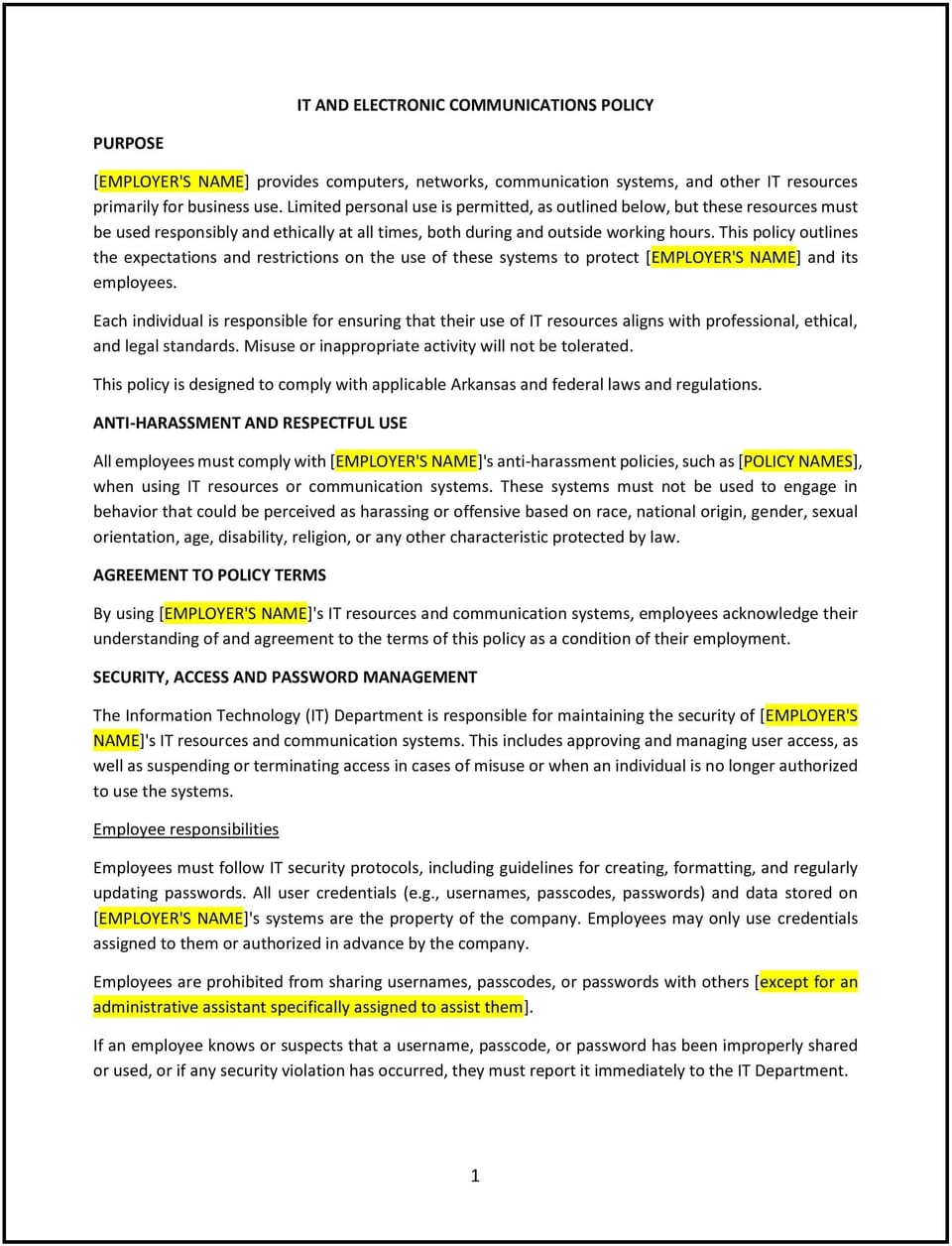IT and electronics communication policy (Arkansas): Free template

IT and electronics communication policy (Arkansas)
In Arkansas, an IT and electronics communication policy provides businesses with guidelines for the proper use of technology resources, including computers, mobile devices, email, and internet access. This policy ensures that employees use these resources responsibly, securely, and in compliance with applicable laws and business standards.
This policy outlines acceptable and prohibited uses of IT resources, security protocols, and the business’s rights to monitor usage. By implementing this policy, Arkansas businesses can protect sensitive information, reduce cybersecurity risks, and ensure compliance with legal requirements.
How to use this IT and electronics communication policy (Arkansas)
- Define acceptable use: Clearly outline permissible activities, such as work-related communication, research, and collaboration, while specifying prohibited activities like unauthorized downloads or personal use during work hours.
- Emphasize security protocols: Include requirements for password protection, secure access, and reporting suspicious activities to maintain IT system integrity.
- Address monitoring practices: Inform employees of the business’s right to monitor electronic communications and system usage to ensure compliance with the policy.
- Set data protection standards: Establish procedures for handling sensitive data, including encryption, restricted access, and secure sharing practices.
- Communicate consequences: Specify the disciplinary actions for policy violations, such as warnings, suspension of access, or termination.
Benefits of using this IT and electronics communication policy (Arkansas)
This policy offers several advantages for Arkansas businesses:
- Enhances security: Protects IT systems and sensitive information from unauthorized access, misuse, or cyber threats.
- Increases productivity: Ensures employees use IT resources efficiently and for business purposes.
- Supports compliance: Aligns with Arkansas and federal regulations, such as data privacy and cybersecurity laws, reducing legal risks.
- Establishes accountability: Sets clear expectations for employee behavior regarding IT and electronic communications.
- Protects business assets: Safeguards hardware, software, and data from damage, theft, or unauthorized use.
Tips for using this IT and electronics communication policy (Arkansas)
- Address Arkansas-specific considerations: Incorporate state laws regarding data privacy, electronic communication, and employee monitoring.
- Provide training: Educate employees on proper IT resource use, recognizing phishing attempts, and following security protocols.
- Use monitoring tools: Implement software to track IT usage and detect policy violations while maintaining transparency.
- Regularly update the policy: Ensure the policy reflects changes in technology, business practices, or legal requirements.
- Communicate the policy clearly: Include the policy in onboarding materials and provide regular reminders to ensure employee awareness.
Q: How does this policy benefit the business?
A: This policy enhances IT security, supports compliance with Arkansas laws, and ensures employees use resources efficiently and responsibly.
Q: What activities are prohibited under this policy?
A: Prohibited activities include unauthorized downloads, accessing inappropriate websites, sharing sensitive information without authorization, and excessive personal use during work hours.
Q: How does this policy support compliance with Arkansas laws?
A: The policy aligns with state and federal regulations, including data privacy and electronic monitoring laws, ensuring lawful use of IT resources.
Q: Can the business monitor employee use of IT resources?
A: Yes, the policy allows the business to monitor IT usage, including emails and internet activity, to ensure compliance and protect its systems, while adhering to legal requirements.
Q: What steps should the business take to enforce this policy?
A: The business should document violations, provide appropriate warnings, and take disciplinary actions as outlined in the policy to ensure compliance.
This article contains general legal information and does not contain legal advice. Cobrief is not a law firm or a substitute for an attorney or law firm. The law is complex and changes often. For legal advice, please ask a lawyer.


